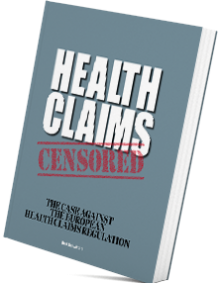3 April 2013
The principle that is carefully hidden in the “basement” of the European Nutrition and Health Claims Regulation is the Precautionary Principle. It is not mentioned or referenced anywhere in the Regulation, but it does form the basis for the a priori and indiscriminate prohibition of all nutrition and health claims. In combination with this prohibition, precaution also entails reserving the exclusive power to the European Union’s legislature to authorize and legalize claims by including them in positive lists.
In prohibiting nutrition and health claims ex ante of their assessment and legalization, the Claims Regulation makes no distinction whatsoever between truthful and misleading claims. It cannot make this distinction, because the prohibition of claims takes place ex ante of their evaluation and possible legalisation. Evidently, what’s wrong with nutrition and health claims is not that there’s something wrong with them, but that they’re commercial.
In the precautionary “mindset,” there’s a self-evident uncertain risk that there may be something wrong with commercial speech concerning nutrition and/or health claims because the speech is commercial. According to the precautionists, to precaution this assumed risk, we better do away with commercial speech and replace it by legalized public speech that may be used in what’s left of commercial speech. This is how the Claims Regulation conclusively, permanently and irreversibly ended the making of commercial health claims, no matter how truthful, correct and scientifically proven they are.
The Precautionary Principle is definitely not a General Principle of European Law. There is no legal definition of the principle. There is no scientific definition of the principle. On the way to a risk-free life for everyone, we find formulations made according to the occasion. One of these formulations can be found in Article 7 of the European Union’s General Food Law[1]:
Article 7 – Regulation 178/2002/EC
Precautionary principle
1. In specific circumstances where, following an assessment of available information, the possibility of harmful effects on health is identified but scientific uncertainty persists, provisional risk management measures necessary to ensure the high level of health protection chosen in the Community may be adopted, pending further scientific information for a more comprehensive risk assessment.
2. Measures adopted on the basis of paragraph 1 shall be proportionate and no more restrictive of trade than is required to achieve the high level of health protection chosen in the Community, regard being had to technical and economic feasibility and other factors regarded as legitimate in the matter under consideration. The measures shall be reviewed within a reasonable period of time, depending on the nature of the risk to life or health identified and the type of scientific information needed to clarify the scientific uncertainty and to conduct a more comprehensive risk assessment.
Clearly, precaution in the field of European Food Law concerns the uncertain risk that a food of foodstuff may possibly cause harmful effects on health. The effect of this measure is that all foods placed on the market are intrinsically very safe under normal conditions of consumption. An important side-effect of Article 7 is that nutrition and health claims placed on these very safe foods cannot possibly cause harmful effects on health. In spite of this, nutrition and health claims are precautioned. Why ?
Because, following an assessment of available information, there seems to be a persisting uncertain risk that commercial nutrition and health claims might be misleading. So, claims must be evaluated, not by making an analysis of the uncertain risk that a claim may cause harmful effects on health, but by making an analysis of the claimed benefits.
It is at this point that the precautionary approach is abandoned. Where the legislature considered “available information” and uncertainty an acceptable and proportionate legal basis for prohibiting health claims ex ante of their assessment, nothing less than complete certainty produced by generally accepted scientific evidence based on double blind placebo controlled randomized clinical trials is the threshold in authorizing claims. Where harm may be assumed, benefits must be conclusively proven. In the name of a high level of protection this duplicious approach produces a reduction of the risk on harm and a reduction of the “risk” on benefits. It is assumed but never proved that in this risk-free society – free of risks on harm and free of “risks” on benefits – all will be well.
If the European legislature would be man enough to honestly and indiscriminately apply the Precautionary Principle, not just to precaution the possibility of suffering harm or loss, but also to permit, following an assessment of available information, the possibility of enjoying benefits or gains, we would have numerous nutrition and health claims stating, suggesting or implying that a possible or probablerelationship exists between a food category, a food or one of its constituents and health.
It requires only the replacement of a few words in Article 7 of Regulation 178/2002/EC and the addition of the following paragraphs to this Regulation to make this happen:
Article 7 – Regulation 178/2002/EC
Precautionary principle applied to possible benefits
3. In specific circumstances where, following an assessment of available information, the possibility of beneficial effects on health is identified but scientific uncertainty persists, provisional benefitmanagement measures necessary to ensure the high level of health chosen in the Community may be adopted, pending further scientific information for a more comprehensive benefit assessment.
4. Measures adopted on the basis of paragraph 1 shall be proportionate and no less permissive of trade than is required to achieve the high level of health chosen in the Community, regard being had to technical and economic feasibility and other factors regarded as legitimate in the matter under consideration. The measures shall be reviewed within a reasonable period of time, depending on the nature of the benefit to life or health identified and the type of scientific information needed to clarify the scientific uncertainty and to conduct a more comprehensive benefit assessment.
If the Precautionary Principle would be indiscriminately applied to risks on harm and “risks” on benefits, we would have reduced risk on harm and increased “risk” on benefits.
Bert Schwitters
[1] Regulation 178/2002/EC.




